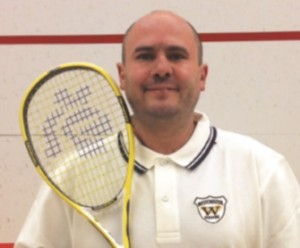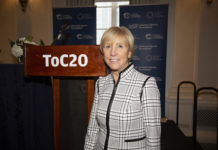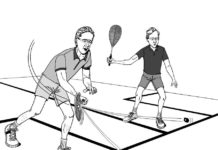
Lester Brown, Squash Pro at Westchester Squash, Westchester, NY
Where did you grow up?
Toronto, Canada.
When and why did you start playing squash?
I started playing squash in 1988 when I was twenty-one years old. I took a part-time job at Pine Valley Racquets Club while attending York University and fell in love with the game. Within six months I made my college team, and in two years I became an A-level player. Over the next six years, I played in a multitude of tournaments and league play, eventually making the Toronto Premier League.
You have been coaching squash players of various ages and skill levels for over 20 years, what do you enjoy most about coaching? What are the differences between coaching junior players and adult players?
I enjoy both the technical and tactical aspects of the game. Coaching swing technique is very important, and one of the biggest challenges is teaching a tennis player the correct—and very different—swing path for squash. I also enjoy teaching the strategy of the game at all levels.
What is your favorite coaching memory?
It’s very difficult to single out one moment. One of my favorite things about coaching is being involved in peoples’ “firsts”—their first serve in, their first shot to the back of the court, their first match win, and finally, their first tournament win.
Your club, Westchester Squash, hosts several junior tournaments each year. How would you describe the atmosphere of competitive junior squash in Westchester?
The level of squash has definitely increased in Westchester. Having run tournaments here for many years, it’s great to see kids improve and go from bronze tournaments all the way up to nationally ranked players.
Scholastic leagues are one of the fastest growing areas of squash in America. Can you talk about your involvement with scholastic teams at Westchester Squash?
We coach two middle school teams and two high school club teams at Westchester Squash. I believe that the inclusion of middle school teams in the national championships has made our sport grow exponentially. Kids are now starting to play squash at much earlier ages—some as young as four or five—and the next step is to have elementary school championships.
Westchester Squash has a budding junior summer camp program. What do you focus on teaching and developing at these summer camps? Does it differ from what you focus on during the squash season?
Our goal for summer camps is to have every kid improve their game. Each child is given an equal amount of attention, whether they are just starting squash or are an advanced player. We make sure there is a balance of instruction, competitive play, and fun. The interaction between the different levels and ages of players helps to build relationships throughout the camps.
What makes Westchester Squash unique? Can you say a bit about your squash community?
Our club is set up like a living room. When kids come to play or have lessons, oftentimes their siblings accompany them. Non-players can sit down to do homework, play on their iPads, and eventually they want to start playing squash as well. At Westchester Squash, we consider ourselves a family, and when you walk into the club, you become a part of that family.





